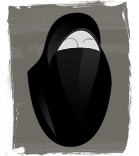As I am writing this, at a state dinner for Canadian Prime Minister Justin Trudeau is being served by the White House chefs a dish famous as a late-night treat in Quebec, poutine, composed of French fries, covered with cheese curds and topped by brown gravy – a triple cholesterol threat. The version being served at the state dinner is somewhat different, according to the Washington Post: “shavings of smoked duck and cheese curds finished with red wine gravy and served on delicate wafer fries: a one-bite canapé.” The basic dish is well known in Canada and in parts of the northern US and, according to Wikipedia, in other places as well, including an Italian poutine with Bolognese sauce. Given the numerous jokes about US citizens moving north of the border, as soon as President Trump is sworn in, those would-be Canadians may want to get used to the notion of eating the fastfood treat, but without the gourmet makeover being served tonight.
Canada
Uncover the face

Graphic by the Quebec government showing one example of a banned public dress under a proposed Charter
In the news recently there have been reports on initiatives in various countries to restrict how Muslim women may dress, specifically to ban clothing in public that covers the face. That means outlawing the burqa and the hijab. Most recently, there is a proposed law for Quebec as well as for the Canton of Ticino in Switzerland. Most of the initiatives now and in the past (in France and Belgium, for example) have been made with justifications centered around security (not being able to recognize the identity of someone with her face covered), safety (lack of peripheral vision when driving), or the maintenance of laity (strict separation of church and state, particularly in schools). Xenophobia, particularly towards Muslims, is never mentioned. In some case, parallel movements pretty clearly point in this direction. In Switzerland, for example, a law was passed in 2009 banning the building of minarets, despite the fact that there are very few mosques in the country. The Quebec government’s proposed “Charter of Values,” would prohibit public servants from wearing “overt and conspicuous” religious symbols, thus insuring a “religiously neutral state.” Yet, the province’s minister for democratic institutions, Bernard Drainville, told TIME Magazine “Quebec is not a blank page…Building our future shouldn’t come at the expense of our past, our heritage.” What he meant by that statement is clear: Christianity as part of the Quebequois culture will continue to enjoy privileged status.
The promoter of the initiative in Ticino is quite explicit in his goals, according to the Wall Street Journal:
[The law] is being spearheaded by Giorgio Ghiringhelli, a 61-year-old political activist and former journalist. Although burqas are rarely seen in Ticino, where less than 2% of the roughly 340,000 inhabitants identify as Muslim, Mr. Ghiringhelli said his ban could help curb Islamic extremism before it takes root, and would be “a strong signal for Switzerland and maybe for other countries” to follow suit.
Identifying Muslim dress as an indicator of political fanaticism is an attack on Islam as well as a strike against religious freedom. It’s ironic that we in the West often rail against mistreatment of Christians in Muslim countries, yet don’t see that with such initiatives we are just as guilty of intolerance and blind prejudice.
